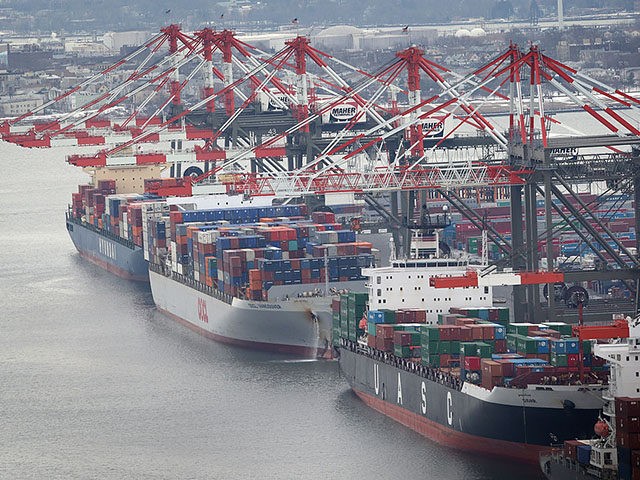U.S. Customs and Border Protection (CBP) revealed Wednesday that it had seized a shipment in Newark, NJ, containing $800,000 worth of human hair originating in Xinjiang, China, where the Communist Party maintains concentration camps.
Multiple reports have concluded that China has established concentration camps to repress and eliminate the Uyghur, Kazakh, and Kyrgyz Muslim ethnic minorities in Xinjiang, the largest and westernmost province in the country. For years, Chinese officials have insisted that the camps are “vocational training” institutes where underprivileged minorities obtain job skills that improve their chances of a prosperous life in modern China.
Survivors of the camps have testified to the prevalence of indoctrination, torture, rape, slavery, murder, and forced organ harvesting, sterilization, and abortion.
Reports have identified dozens of multinational corporations — including American companies like Nike and Apple — as having ties to factories in China believed to use Uyghur slaves for manufacturing. Some identified companies have vowed to take their business out of Xinjiang following the reports. However, videos that depict China moving thousands of Uyghurs out of Xinjiang to other provinces suggest it will be difficult for international companies to guarantee that the factories they do business with are not profiting from Uyghur slavery.
Subsequent reports indicate that, in light of lockdowns prompted by the Chinese coronavirus pandemic, China has begun busing Muslim prisoners out of Xinjiang to labor in factories previously kept operative by Han forced labor.
CBP did not conclude definitively that the human hair seized in Newark came from Uyghur or other Muslim concentration camp victims. Instead, in a statement, the agency noted that the shipment represented a case of “potential human right abuses of forced child labor and imprisonment.”
“The products were part of shipment of almost 13 tons of hair products worth over $800,000 dollars,” CBP noted, identifying them as being the property of “Lop County Meixin Hair Product Co. Ltd.,” a Chinese company. According to Radio Free Europe/Radio Liberty (RFE/RL), the company is one of three the United States has recently blacklisted due to evidence that it traffics in goods made by slaves.
“On June 17, CBP instructed ports of entry nationwide to detain all such products based on information that reasonably indicated that they are manufactured with the use of prison labor,” CBP said. “The manufacturing process may include additional situations of forced labor, including, but not limited to, excessive overtime, withholding of wages, and the restriction of movement.”
CBP added a warning to American companies importing from abroad that they have the legal responsibility to “confirm their supply chains are free of forced labor in order to ensure the origin and quality of goods consumed by the American public align with the laws and principles established by the United States Government and to protect the American economy.”
That warning echoed remarks by Secretary of State Mike Pompeo on Wednesday following the rollout of an official “advisory” to American companies that trafficking in goods made by slaves is illegal, no matter where in the supply chain a slave good makes it way into the process.
“The advisory will make businesses aware of the potential exposure in their supply chains to entities that engage in human rights abuses in Xinjiang — or elsewhere in China — and the associated reputational, economic, and legal risks of such involvement,” Pompeo said in a statement.
The office of State Department spokesperson Morgan Ortagus also issued a statement warning, “Businesses with potential exposure in their supply chain to entities that engage in human rights abuses in Xinjiang … should be aware of the reputational, economic, and legal risks of involvement with such entities.”
The State Department did not, however, specify any enforcement mechanism for ensuring that these companies receive punishment if found to be involved in the traffic of slave labor. The CBP statement on the hair shipment did not identify any individuals facing criminal consequences.
The CBP statement also did not elaborate on the origin of the human hair, so it remains unclear if the hair was sourced from concentration camp victims. CBP appears to have reasonable suspicions that the products were manufactured in the camps, however.
Reports indicate that China has constructed as many as 1,200 concentration camps in Xinjiang by mid-2019.
Experts on the repression of Uyghurs in Xinjiang testified to Congress last year that it is impossible for an international company to guarantee that slavery is not present anywhere in its supply chain if it does business in Xinjiang.
“Corporate supply-chain due diligence is impossible,” Uyghur-American attorney and current member of the U.S. Commission on International Religious Freedom (USCIRF) Nury Turkel told Congress in October. “Because due diligence is impossible, companies cannot carry out their claims to manage their supply chains in accordance with ethical principles. By definition, no company can provide credible assurance that products sourced in Xinjiang qualify for legal import into the United States, or any country that bans the import of forced-labor products.”

COMMENTS
Please let us know if you're having issues with commenting.